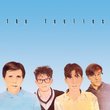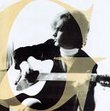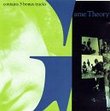| All Artists: Game Theor Title: Lolita Nation Members Wishing: 7 Total Copies: 0 Label: Capitol Release Date: 10/25/1990 Genres: Alternative Rock, Pop, Rock Styles: Indie & Lo-Fi, American Alternative, Power Pop Number of Discs: 1 SwapaCD Credits: 1 UPC: 018777328029 |
Search - Game Theor :: Lolita Nation
 | Game Theor Lolita Nation Genres: Alternative Rock, Pop, Rock
|
Larger Image |
CD DetailsSimilar CDs
|
CD ReviewsOsterized power-pop, new-wave, studio-snips John L Murphy | Los Angeles | 02/04/2006 (4 out of 5 stars) "The legend of this album has only grown since it appeared, and the impossibility of finding a CD version (unless auctioned for over $100) makes it all the more desired. As the comments here accurately summarize, this ambitious collection should not be the first, but probably the fourth album you listen to. I am exactly the same age as Scott Miller, and so I have always felt as if he was speaking for me. Amazing to think that I read a review of their first or so EP in the same issue of BAM that mentioned on the same page another indie EP: REM's "Chronic Town." The other GT releases I'd recommend in order are Big Shot Chronicles, the most compact and punchy; Real Nighttime, the first strong one from the mid-80s; and either Two Steps, not nearly as lackluster as I thought it was in the wake of Lolita Nation when it first appeared, or the wonderfully titled Tinker to Evers to Chance compilation. Distortion of Glory collects, and re-records, some of the early ep's. I had transferred LN from my LPs to digital files (recommended as the LPs can still be found used at a fraction asked for the much rarer CD), rather time-consuming, but it also allowed me to punch up the bass levels, for as much as I love Mitch Easter's production, the trebly quality and Scott Miller's pitch do make for a rather wobbly sonic assault at times as the minutes accumulate in an album that demands attention and concentration, and isn't background music. This is what made GT so engrossing: Miller and his ever-changing crew may have made him the Mark E Smith of college rock's heyday, but his talent, intellect, and self-deprecating persona made his gift for hooks and his ear for tunes and those who could express his musical swirl as if effortlessly--all this is concentrated and pulverized on these 27 tracks. It was compared to Finnegans Wake in one review; the possibilities of language and its fracturing and reassembly have, remarkably, been little exploited by others in indie rock before the advent of sampling and ProTools. Leave it to a computer code-writing genius with a penchant for recording on the side to make this a mind-expanding reality. I played it the other day to see how it had weathered time. The collages and the tinkly keyboards, two characteristic features throughout Miller's career, come to the forefront here, sometimes at the expense of the guitar-bass-drum crunch. The album does go on at times beyond one's ability to sit through it, but the sprawl invites one's admiration, if not always promotes its willfully eccentric accessibility. The contributions of Gui, Gil, Shelley, Donette, and the supporting musicians Easter invited (along with himself) to play deserve acclaim. This is a perhaps inevitably uneven and at times playfully annoying album, but for sheer reach, it far surpasses nearly everything else from its time. Five stars for effort, if only four, honestly, for achievement: this could have been crafted for CD if not 2 LPs originally and better have used its running time, in hindsight. It's fun, but wearying in its density. Half of it's great, the other half never less than listenable, which for a struggling indie band working in bits and pieces on a tiny label and small budget is quite a success. In closing, I might add that a former member of GT told me that even her CD copy of LN had been given to her by a fan years after it had been issued! Such is the rarity of it, apparently. So, tape the LPs and we can only hope for its reissue one day in some remastered remodeled 20th anniversary edition. I suppose some legal wrangling must be preventing the re-release of GT (and Loud Family) records? Here's a plea for them again, as new fans who missed out the first time around should not have to languish when such enjoyable and smart music awaits." "I couldn't face this heaven alone" Laszlo Matyas | 05/17/2008 (5 out of 5 stars) "If this album is ever reissued, buy it immediately. Immediately. To be perfectly honest, the idea of buying Lolita Nation in a straightforward matter, in the same way that one would buy Kind of Blue or ...Baby One More Time or War And Peace or the Bible or the latest issue of Playboy, just by exchanging a moderate (i.e. non triple-digit) sum of money and receiving a brand-new copy in return, is enough to send shivers down my spine. That action, in and of itself, would validate the very notion of capitalism. "Capitalism," one could say, "has allowed me to own a copy of Lolita Nation." And that would be enough. If you're still reading this, then you probably want to know what the hell I'm talking about. Well, it all comes down to this: Lolita Nation, despite being hopelessly out of print and stunningly expensive, is one of the most essential albums of the rock `n' roll era, and one of the most relentlessly wonderful musical statements of all time. It isn't even debatable: Anybody who gives a damn about rock, pop, punk, or emotional expression should do everything within his or her power to seek out a copy. If the used price of Amazon is too rich for your blood, get thee to eBay. Find a vinyl copy if you can (they tend to be significantly cheaper) and rip it to your computer. Splurge a little, if you must. Miss a house payment, if that's what it takes. Trust me, it's worth it. You'll thank me after you've listened to the album. It may take a couple of listens to truly absorb, because the record itself is so sprawling and complex, so eager to wriggle its way under your skin in every way it can imagine all at once, that you may be overwhelmed. You may miss those gorgeous melodies the first couple of times around, but be patient: The record will sink its hooks into you eventually. There's an entire universe of sound here, waiting to unfold and envelope you. After that, it may very well become the gold standard of your record collection. They say that after one learns to understand the music of J.S. Bach, it becomes impossible to truly enjoy anything else. I say the same thing about Game Theory, and about this album in particular. Why? Simple: Lolita Nation is easily the greatest expression of pop genius since Pet Sounds. Hell, it could even be better than Pet Sounds. At the heart of its sound is the melodic virtuosity and lyrical magic of Scott Miller, the band's chief vocalist, guitarist, and songwriter. The man was master of catchy-pop-as-means-for-spiritual-expression, infusing every hook and lilt of his music with enough emotional expressiveness to last some bands their entire careers. Lyrically, he competes with, and triumphs over, such luminaries as Morrissey (of the Smiths), Arthur Lee (of Love), and even Lou Reed (of the Velvet Underground). Like these aforementioned masters, he excels at transforming angst into ironic, endearing poetry. But Miller is subtler than these cats, avoiding the annoying melodrama and self-absorption that plagues most woeful lyricists. He's got a knack for charmingly self-deprecating humor and clever turns of phrase. And his voice is perfect- not technically great, mind you, but very expressive in a manner that brings to mind Bob Dylan. So, what's so great about this specific album? Well, for one thing, it proves that in addition to compositional skill, Miller had vision. It's an expansive album (a double LP back in the days of vinyl) that encompasses the man's entire musical and emotional worldview. It's at once endlessly catchy and fiercely experimental, full of deep pop hooks and feedback-laden tangents, with acoustic janglers that spill into sample-based sound collages. These experimental flourishes never sound forced or pretentious. All they do is highlight the album's insularity. It's a sort of musical palate cleansing, a means of taking the record out of time and place, allowing it to occupy its own unique little world. And really, there isn't all that much weird stuff. The real draw here is the songs. The best stuff here is among the greatest music ever recorded. Even the minor stuff is miles beyond what most people are capable of: "Nothing New" swells with fractured beauty, and "Dripping With Looks" is a hot, dreamy, glacial bubble of electric sound. "Shard," "Go Ahead, You're Dying To," "The World's Easiest Job," and "Exactly What You Don't Want To Hear" show that Scott could pack gorgeous songs into incredibly short running lengths, while "Look Away" and "Mammoth Gardens" (particularly the latter) are fantastic paisley-underground janglers that feature Miller's girlfriend Donnette Thayer on lead vocals. But the best songs leave even these worthy classics in the dust. "We Love You Carol and Alison," "The Real Sheila," and "Andy In Ten Years" are among the most perfect indie pop songs ever created, while "One More For Saint Michael" is ridiculously cool. The final three songs ("Chardonnay," "Last Day That We're Young," and "Together Now, Very Minor") form an absolutely gorgeous conceptual mini-cycle, a meditation on the carefree innocence of youth ("Chardonnay") leading into the apocalyptic notion of maturity ("Last Day That We're Young") and the face-to-face confrontation with mortality ("Together Now, Very Minor"). "Chardonnay" is simply one of the most irresistibly infectious (and stunningly poetic) songs ever written, while "Together Now, Very Minor" is as smart and endearing as it is mournful. "Last Day That We're Young" is so poignant, so beautifully pained and heartbreakingly articulated, that I often find it difficult to listen to without being overcome by my own private longings. And then there's "The Waist and the Knees." Good God, what an amazing song. Despite the other excellent music on this album, "The Waist and the Knees" towers over the rest of Lolita Nation, a god among gods. It's an apocalyptic rush of emotion, a visceral encapsulation of your hopes and anxieties, of the forces that knock you down and the drive that pulls you back up, of fear and humor and love and desperation, all of it contained in Miller's cavernous vocals and that charging guitar riff, and that amazing rhythm, and the clusters of experimental noise that punctuate the verses. Sheer genius. No two ways about it: Get this album by any means necessary." A real trip Michael Mcewen | 09/23/2006 (5 out of 5 stars) "Lolita Nation was my first Game Theory album. They were playing it at a cool record store I frequented and I was captivated. Lucky thing that I picked up the CD (who knew?). I didn't even have a CD player yet, but I knew I would one day (I borrowed a friend's to dub off a copy).
It alternates between "sound collage" and pop masterpieces. When I was younger I found the sometimes noisy mix pieces brilliant, as I aged they started to cloy a bit, older still, I've come full circle and like them again. They work well to bind the album together. It was a fun thrill to find that many of the snippets are from earlier albums. The songs are what really shine, though. I love the quirky, jerky "World's Easiest Job". The straightfoward "Look Away" and "Mammoth Gardens" rock along nicely. "One More For Saint Michael" has a great Star Trek reference (how can you not love that...assuming of course you are into that kind of thing.) "We Love You, Carol and Allison" features the odd harmonies that feature heavily in later Scott's Loud Family work. Completing this musical journey is the final track, "Together Now, Very Minor", a beautiful stripped down acoustic track. The lyrics can be oblique and Scott's voice is unique (he mocks it himself), but there is no questioning his talent. It may not be relevant to this review, but I managed to catch them on this tour in Houston. Great show. Others here recommend starting with Big Shot Chronicles and maybe they have a point since it is a much more instantly accessible album, but I'll never forget standing in that record store listening to the album as if in a trance. Magic." |

 Track Listings (27) - Disc #1
Track Listings (27) - Disc #1


